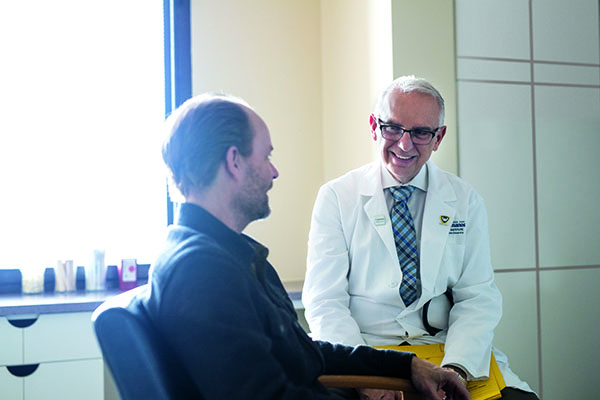Six myths you may have heard in conversations about clinical trials

A clinical trial is a research study that examines new cancer-fighting drugs, surgical methods, diagnostic tests or disease prevention methods. These new treatment methods are only possible because patients participated in the clinical trials. These studies offer hope to patients and their families. Many patients who have participated in clinical trials through the Barbara Ann Karmanos Cancer Institute have experienced more time with their families, received the good news that their tumor has stopped growing, continued life with fewer complications following treatment and achieved successful remission.
The goal of eliminating cancer while minimizing side effects is ongoing at Karmanos. Researchers work tirelessly on these studies to find new and more effective therapies. Clinical trials allow physicians to observe new treatments, see what works best, and discover how they can improve the current standard of care for cancer patients. All of this is achieved because patients agree to contribute to the mission of finding tomorrow’s cure today.
Large academic centers and research institutes like Karmanos offer the broadest portfolio of clinical trials. We offer approximately 250 promising new cancer treatments at any time, often available only at Karmanos.
However, the mention of clinical trials often has an adverse reaction due to misunderstanding. Here are some common myths about clinical trials you may have heard:
MYTH: Clinical trials are only for people with severe cancer and no other treatment options.
TRUTH: Clinical trials are available for different stages of cancer and various cancer types. For example, there are trials for newly diagnosed cancers where one drug or a combination of treatments is used as the first line of treatment. There are clinical trials for patients who have already been treated for their cancer up to four times in the past with no cure, plus trials that treat recurrent cancer after successful treatment the first time around.
MYTH: Clinical trials are just drug studies.
TRUTH: Clinical trials can be medicinal, given either orally or through an IV (intravenous) tube, and also can include testing different types of radiation, challenging the effectiveness of different radiation doses, discovering new surgery techniques, or a combination of treatment modalities.
MYTH: Patients in clinical trials participate in an experiment and are treated like guinea pigs.
TRUTH: Scientific evidence supports the development and design of medical studies. Multiple layers of local and national approval are required for clinical trial treatment. What works for one patient may not work for all patients, so cancer treatment, in general, can be trial and error. Clinical trials are no different. Just like when a patient goes through standard treatment, Karmanos physicians and staff monitor patients closely for safety. Regulatory agencies, such as the Food and Drug Administration (FDA), oversee clinical trials to ensure they are designed and conducted with patient safety in mind. It is also important that patients disclose any side effects and difficulties when going through a trial.
MYTH: Once you sign up, you’re stuck.
TRUTH: When it comes to clinical trials, there is informed consent. Patients voluntarily participate and can withdraw from the study at any time. Before beginning treatment, the physician discusses each treatment option available to the patient. If the physician believes a clinical trial would be best for that patient’s cancer case, the physician explains why, but the decision is ultimately up to the patient. Karmanos physicians and research team members are always available to the patient to answer questions.
MYTH: Insurance doesn’t cover clinical trials.
TRUTH: Most insurance plans do cover clinical trials. When agreeing to participate in a clinical trial, the patient will receive information on what will be billed to insurance and what is covered due to their participation in the study.
MYTH: I must live near a major hospital to participate in a clinical trial.
TRUTH: As Michigan’s largest cancer care provider, we have an advantage. As part of McLaren Health Care, Karmanos offers trial participation to patients, including those seen at Karmanos Cancer Network (Network) locations throughout Michigan and northwest Ohio. Click here to find a Karmanos location near you.
Out-of-state residents may also come to Karmanos to participate in a clinical trial study. Karmanos can assist patients who travel to one of their locations for treatment with discounted hotel accommodations and additional resources on a case-by-case basis.
Clinical trials are tomorrow’s treatments available today.
As one of the requirements to be a National Cancer Institute (NCI)-designated comprehensive Cancer Center, the Barbara Ann Karmanos Cancer Institute in Detroit must offer early-phase clinical trials and promising treatments to patients, plus make these trials accessible through the Network. One-third of all new cancer drugs were developed with Karmanos’ participation in clinical trials.
Karmanos offers multi-institutional, nationwide studies, including clinical trials that begin at the Detroit headquarters. Many patients find favorable outcomes through the Clinical Trials Program at Karmanos, as they receive treatment therapies unavailable at cancer centers and hospitals without the NCI designation.
Learn more about the Clinical Trials Program at Karmanos.
If you or a loved one has recently been diagnosed with cancer, it is important to see a trained specialist. Our oncologists throughout the Network can review your case. You may also visit our clinical trials study information portal. Medical professionals, researchers and the general public use this site to search for new studies to treat various stages of cancer. Visit karmanos.org/clinicaltrials for more information and to download the Karmanos Trials App.
Karmanos Locations
Find a Karmanos Cancer Institute near you.
Click here